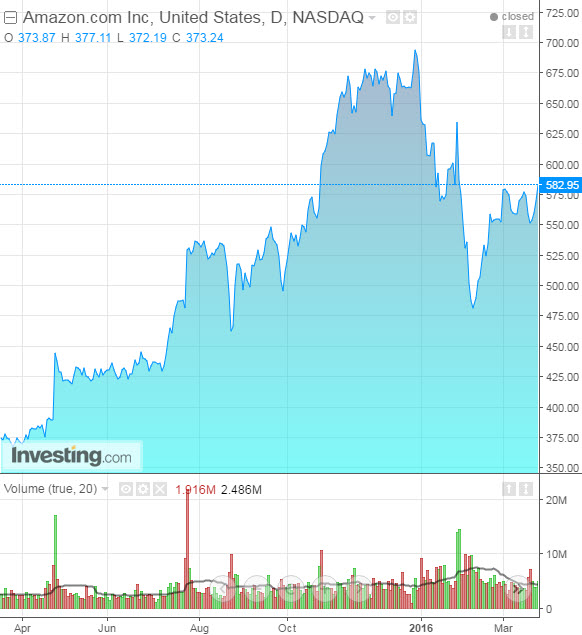by Clement Thibault
Amazon's stock has been struggling over the past few weeks and not just because the overall market has been down since the start of 2016. Some indexes have just begun to recover, but while the S&P 500 is only fractionally under positive territory, the NASDAQ is down 2.5% on the year. And Amazon, (NASDAQ:AMZN), the most active NASDAQ stock by dollar volume, as well as approximately 5.4% by weight of the NASDAQ 100, is down considerably more—13.75% on the year. This may surprise many investors, since Amazon ranked #2 on our top performers list of 2015.

For the general consumer, Amazon is best known as the online Wal-Mart (NYSE:WMT), an e-tailer selling just about anything one could want. Of course in some ways this is true. Today, the company's market cap is at $275B, higher than Wal-Mart's $217B.
But while Amazon has become the world's largest retailer, its cloud computing business, known as Amazon Web Services (AWS), is where the real action—and potential growth—is taking place. That division's business model is based on renting server access to business customers and providing on-demand delivery on IT resources, erasing the need for companies to invest in costly in-house systems.
Currently, the cloud computing segment of Amazon's business represents $27B of its $106B revenue, but it's growing a lot faster than Amazon's retail segment. Twelve month trailing, Amazon's services revenue has grown by 50%, while its traditional retail business has grown by a bit under 13%.
Right now, AWS is the market leader of the infrastructure-as-a-services market, with roughly 27% of market share, compared to Microsoft's (NASDAQ:MSFT) 16% and IBM's (NYSE:IBM) 12%. Moreover, Amazon Web Services is expected to hit $10B in revenue this year, which makes it one of the fastest revenue growing enterprises ever.
So why isn't Amazon's share price continuing its extraordinary push higher?
Part of the answer resides with the word extraordinary in the question above. A 120% explosion in share price over one year is exceptional, and obviously unsustainable. This is not to say Amazon won't keep on growing its revenue and adding value, but after an incredible 2015, it makes sense for investors to lower their future expectations.
It's also possible that Amazon's valuation is being examined a bit more intensively after the brief bear market we've just come through. Traditionally, Amazon investors focus on long-term growth rather than on short-term profits, and up until now Wall Street has been fine with that, as evidenced by the company's price-to-earnings (P/E) ratio of 470. For comparison sake, the average S&P P/E is in the mid-20s.
Amazon's recent share price drop might be a sign that the Street's patience is finally running out and it's time for Amazon to shift out of its waning era of possibility and enter its era of profitability. The problem, of course, is that as strong as Amazon's businesses might potentially be, objectively, overall, it is still probably overvalued.
But the real brewing challenge the company could be facing is over Amazon Web Services. The competition is ramping up its efforts in the market share war. Alphabet (NASDAQ:GOOGL), aka Google, has decided not to concede to Amazon's dominance in the field ($7.9B in sales last year), and has recently signed on some new, high-profile customers to its Google Cloud division including Disney's (NYSE:DIS) Consumer Products and Interactive Media Divisions, as well as Home Depot (NYSE:HD).
Additionally, as part of this effort, it's likely that Google Cloud might initiate a price cut in the near future, as a way to drive its market share. Considering that AWS needed a big round of price alterations just recently to boost its profit margins from 8% to 24%, Google undercutting AWS would be very bad news.
If all that weren't enough, Google Cloud recently managed to attract leading music streaming service Spotify – a long time customer of AWS. According to Spotify's VP of infrastructure, Nicholas Harteau, the move is a combination of a competitive price offering and Google's position as a "leader in the data space". Clearly, cloud computing is rapidly becoming a contested area among the world's technology giants. Microsoft's Azure posted $1.1 billion in sales, while Google's Cloud Platform lagged at $500 million. It looks like an intriguing battle could dominate over the next few years.
Overall, Amazon remains a good, sustainable business. Every analyst agrees on that point.
But for the investor, the business is only as good as the price at which you bought it. The market seems to have come to the realization that it is pricing Amazon according to sustained, extraordinary growth. But the bulk of AMZN's exceptional growth might already be behind us.
